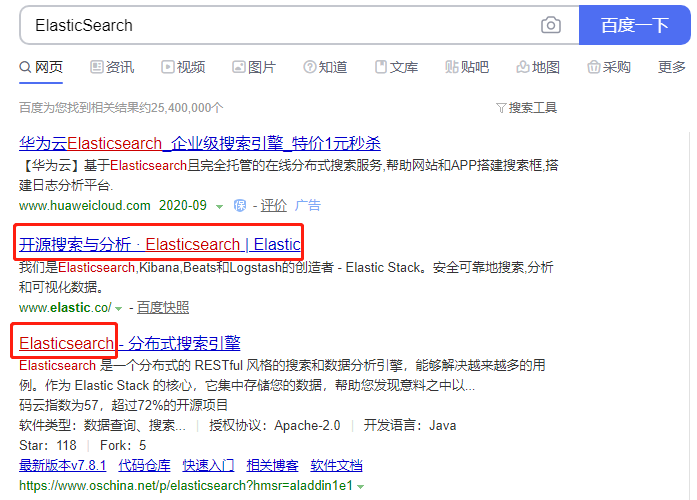ElasticSearch入门(三)
为了方便接下来的例子演示,我们新创建一个索引名为compony,type为person的文档,里面添加四个人,还是使用postman进行请求
{"name": "zhangsan","age":24,"address":"beijing","word":"i like computer music","interests":["football","dance"]}{"name": "lisi","age":25,"address":"shanghai","word":"i like computer game","interests":["sing","dance"]}{"name": "wangwu","age":26,"address":"guangzhou","word":"i like read book","interests":["poker","game"]}{"name": "zhaoliu","age":27,"address":"chengdu","word":"i like game","interests":["forestry","game"]}
一、全文搜索
查找所有喜欢computer game的人:
localhost:9200/compony/person/_search
{"query" : {"match" : {"word" : "computer game"}}}
得到的结果:
{"took": 225,"timed_out": false,"_shards": {"total": 1,"successful": 1,"skipped": 0,"failed": 0},"hits": {"total": {"value": 3,"relation": "eq"},"max_score": 1.3494902,"hits": [{"_index": "compony","_type": "person","_id": "2","_score": 1.3494902,"_source": {"name": "lisi","age": 25,"address": "shanghai","word": "i like computer game","interests": ["sing","dance"]}},{"_index": "compony","_type": "person","_id": "4","_score": 0.7549127,"_source": {"name": "zhaoliu","age": 27,"address": "chengdu","word": "i like game","interests": ["forestry","game"]}},{"_index": "compony","_type": "person","_id": "1","_score": 0.6747451,"_source": {"name": "zhangsan","age": 24,"address": "beijing","word": "i like computer music","interests": ["football","dance"]}}]}}
其中的_score代表相关性得分,Elasticsearch 默认按照相关性得分排序,即每个文档跟查询的匹配程度。我们这里看到即使是zhaoliu的爱好里面没有computer,但是结果也返回了,因为它里面有game,所以也返回了,只是相关性变低了。这也看出来区别于关系型数据库的概念,数据库中的一条记录要么匹配要么不匹配。
二、短语搜索
找出一个属性中的独立单词是没有问题的,但有时候想要精确匹配一系列单词或者短语 。 比如, 我们想执行这样一个查询,仅匹配同时包含 “computer” 和 “game” ,并且 二者以短语 “computer game” 的形式紧挨着的人员记录。
localhost:9200/compony/person/_search{"query" : {"match_phrase" : {"word" : "computer game"}}}
注意这里与全文搜索变化的地方只有match变为了match_phrase,返回结果:
{"took": 4,"timed_out": false,"_shards": {"total": 1,"successful": 1,"skipped": 0,"failed": 0},"hits": {"total": {"value": 1,"relation": "eq"},"max_score": 1.3494902,"hits": [{"_index": "compony","_type": "person","_id": "2","_score": 1.3494902,"_source": {"name": "lisi","age": 25,"address": "shanghai","word": "i like computer game","interests": ["sing","dance"]}}]}}
这样的查询,只匹配到了lisi这个人
三、高亮搜索
许多应用都倾向于在每个搜索结果中 高亮 部分文本片段,以便让用户知道为何该文档符合查询条件。在 Elasticsearch 中检索出高亮片段也很容易。
再次执行前面的查询,并增加一个新的 highlight 参数:
{"query" : {"match_phrase" : {"word" : "computer game"}},"highlight":{"fields":{"word":{}}}}
查询结果:
{"took": 31,"timed_out": false,"_shards": {"total": 1,"successful": 1,"skipped": 0,"failed": 0},"hits": {"total": {"value": 1,"relation": "eq"},"max_score": 1.3494902,"hits": [{"_index": "compony","_type": "person","_id": "2","_score": 1.3494902,"_source": {"name": "lisi","age": 25,"address": "shanghai","word": "i like computer game","interests": ["sing","dance"]},"highlight": {"word": ["i like <em>computer</em> <em>game</em>"]}}]}}
这样的效果可能与百度搜索那种类似,这只是我的猜测:
官网给出的基本入门也就这么多了,其它的后续看情况要不要做几个demo,现目前计划后续整合springboot在代码层面来展示

